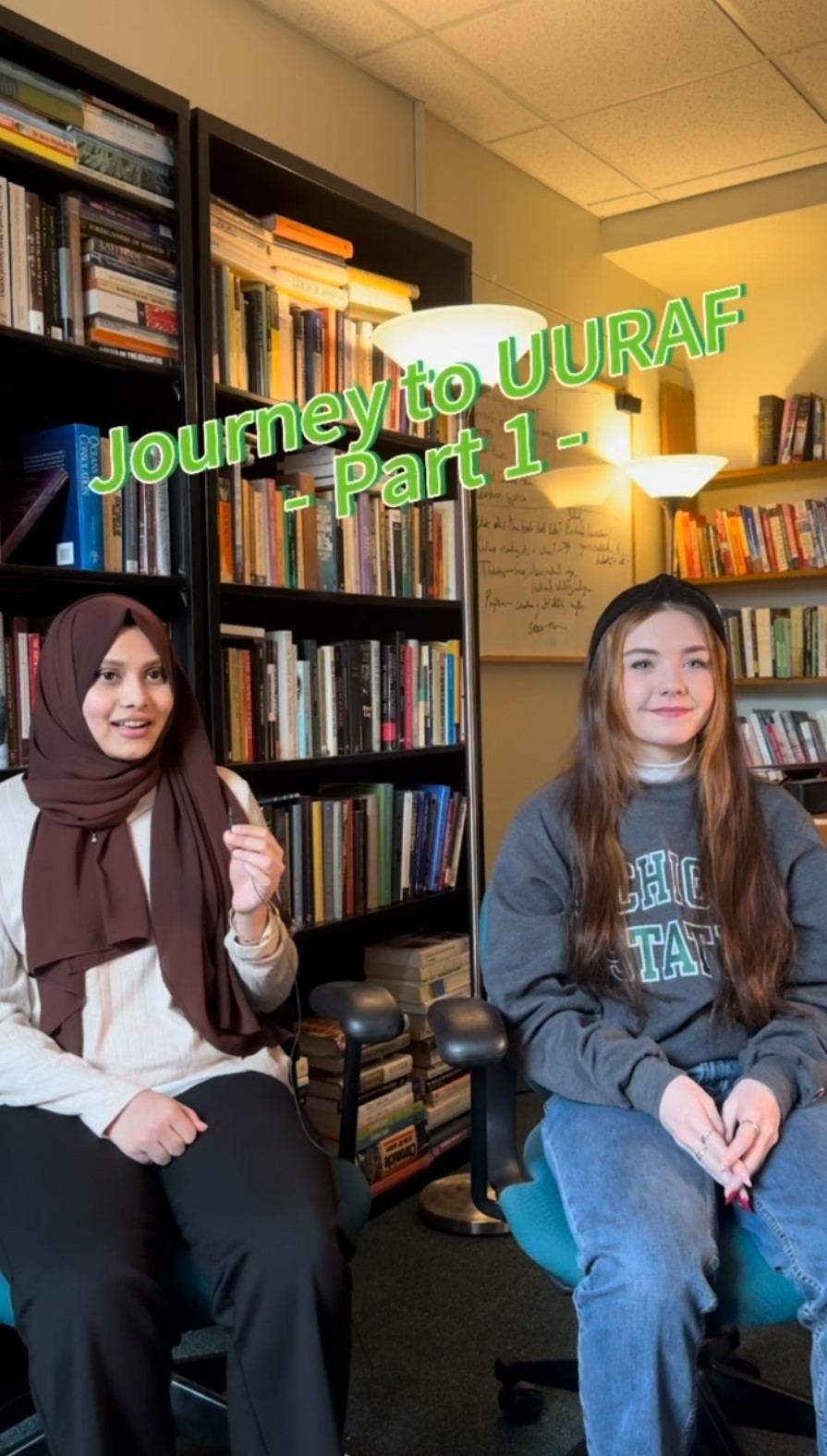Journey to UURAF with Sophia Futo and Sumaiya Imad
April 7, 2024 - Shelly DeJong
 First-year Social Science Scholar students, Sophia Futo from Ohio and Sumaiya Imad from Bangladesh, were awarded Provost Undergraduate Research Initiative (PURI) funding to research how people with lived experience of psychosis can be better involved in clinical psychology research. Working with Dr. Katy Thakkar, they are doing a comprehensive literature review in the United States, the United Kingdom, and other locations around the world. We met with Sophia and Sumaiya to talk about their research, what has surprised them along the way, and why this work is important to them.
First-year Social Science Scholar students, Sophia Futo from Ohio and Sumaiya Imad from Bangladesh, were awarded Provost Undergraduate Research Initiative (PURI) funding to research how people with lived experience of psychosis can be better involved in clinical psychology research. Working with Dr. Katy Thakkar, they are doing a comprehensive literature review in the United States, the United Kingdom, and other locations around the world. We met with Sophia and Sumaiya to talk about their research, what has surprised them along the way, and why this work is important to them.
Watch the interview with Sophia and Sumaiya here.
Congratulations on receiving PURI funding as first-year students! Can you tell us about your research project?
SUMAIYA: Our research project focuses on co-production and psychosis, and we'll be looking at case studies in the UK, the United States, and other countries around the world.
SOPHIA: Essentially, we want to evaluate the levels of co-production in each region with respect to psychosis research because a lot of mental health research is done without the collaboration of those with lived experience of mental illness. That is something that we find very important to psychology research going forward and we'd like to evaluate how better to overcome the barriers that are in place preventing that. We want to get involvement from those who have lived experience with mental illness involved in psychology research and not just be the subject of research.
How did you get plugged into this research?
SUMAIYA: Being an international student coming into a big state school, the Social Science Scholars program was a great gateway to having a more liberal arts feeling in such a big state school. And as freshmen having won one of the most competitive PURI Awards was a big deal for us both. Our professor Dr. Waller, who's the director of the program, connected us with Dr. Thacker from the Department of Psychology because he was aware of our interest in the whole realm of research and mental health.
Why is this research important to both of you?
SUMAIYA: Back in high school I started my own nonprofit where I help women who are victims of human trafficking escape that trade and start their own independent life, being financially free through a vocational training program, mental health workshops and seed funding their entrepreneurial journeys. The case studies that we're researching about are very much relevant to the cases that I've seen firsthand when working with such women. So, all the research that we're doing here would help me implement a better strategy going forward with my nonprofit and policy work in the future.
SOPHIA After college, I hope to work as a forensic psychologist advocating for the improved treatment of mentally ill individuals within our nation’s criminal justice system. Many of them are sentenced to time in prison where they have limited access to adequate treatment. Some are even placed in solitary confinement or made targets of violence by other inmates. Being able to work on a mental health initiative focusing on those with severe mental illness and how we can work to better help them is very important to me.
What has surprised you about research?
SOPHIA: One thing surprising to me getting more involved in research in university is how different it is from the research you're taught about in high school. I know for me in public high school, a lot of the research methods and the introduction we got focused heavily on general science experiments and more physical science and not the behavioral side of things or especially the social science side of things. Research is a lot broader than I thought it would be. Doing literature reviews or analyzing survey data, for example. It's something I've enjoyed getting involved in and growing my experience in that field.
I felt a little intimidated at first, of course. I was extremely grateful for the opportunity to get involved in this project, especially one that's so important to me based on my career interests. But starting research as a first-year student was definitely something very new and something that I had to be shown how to do on campus.
What impact are you hoping to have?
SUMAIYA: When we first got into doing the literature review, we found there weren't a lot of published articles around psychosis and co-production and collaborative spaces in that realm. What we want to do is create an impact in that whole study area and hopefully invite more researchers to come and make a collaborative space where people who have actually had lived experience can share their perspective and put greater impact into positive work that can go into solving such an integral part of our community.

